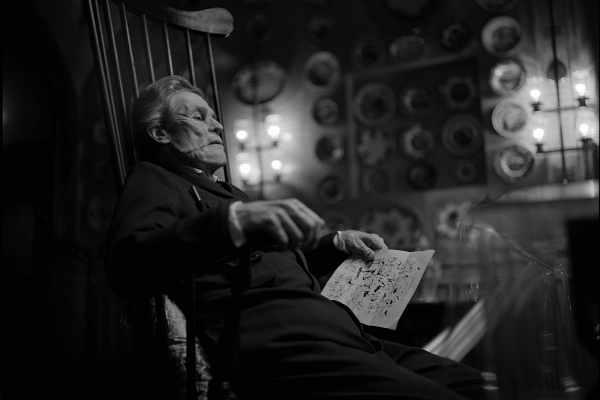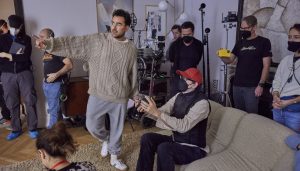
As if involving the likes of Emma Stone, Willem Dafoe, and Mark Ruffalo in a Yorgos Lanthimos film wasn’t enough of a good thing, the delightfully madcap Poor Things treats viewers to the combined prowess of these actors, harnessing their considerable talents for a wickedly funny and fresh reimagining of Mary Shelley’s ‘Frankenstein’. Stone plays Bella Baxter, the creation of mad scientist Dr. Godwin Baxter (Willem Dafoe), who prefers simply to go by the modest moniker “God”. Lanthimos presents Bella Baxter, a dullard reanimated beauty, as a miniature study in maturation. Viewers are invited to observe her journey, witnessing her rapid learning and growth onscreen. From her awkward first steps through her unhinged sexual awakening and eventually onto self-discovery and actualization, Bella’s odyssey is a delightful mix of hysterical black comedy and a thought-provoking feminist manifesto on personal evolution and revolution.
Bella’s story begins in a laboratory, though Tony McNamara’s (The Favourite) script, based on Alasdair Gray’s 1992 novel of the same name, skips over the whole “It’s alive” inception bit. Instead, we meet the shambling baby-in-a-woman’s-body that is Bella Baxter after her birth. Or rebirth. Whatever it is you want to call it. She’s a curious thing nevertheless, a childlike consciousness in a woman’s form. The fascinated-with-life Bella experiments with early language and her own body while the paternal God employs curious lab tech Max McCandles (Ramy Youssef) to closely study her hastened development, take diligent notes, and eventually betroth her. As Bella quickly moves beyond the infantile basic, she starts to question what lay outside the walls of God’s lab and domicile, her embryonic curiosity yearning for the world beyond.
The film’s visual narrative mirrors Bella’s maturation. Lanthimos captures Bella’s early development scenes in black and white, often using a super wide-angle fisheye lens. This approach serves to juxtapose Bella’s doe-eyed, bow-legged innocence, as she encounters the world for the first time, with her confinement. Although her surroundings are loving, the lens starkly contrasts her newfound wonder with the limitations she faces. When the nefarious sexpot Duncan Wedderburn (Mark Ruffalo) offers her a chance to escape her quasi-imprisonment, Bella furiously jumps at the opportunity to see the color and texture of the outside world.
[READ MORE: Our review of Yorgos Lanthimos’ ‘The Favourite’ starring Emma Stone]
As Bella’s brain develops, the world around her initially unfolds in impressionistic, vivid colors, portrayed on fantastical sets reminiscent of early fantasy filmmaking. However, this vibrancy gradually fades, becoming less colorful and more grounded in reality. The explosively vivid and kaleidoscopic vistas of Lisbon transform into an exaggerated portrayal of Alexandria, which, while still heightened, becomes more drab and realistic. While Bella tears through her pubescent stage, she climbs Maslow’s hierarchy of needs. Her initial fascination with simple pleasures gradually fades, giving way to a profound revelation: her body is a means of production in itself, if you catch the drift.
With Bella Baxter’s journey of self discovery taking her from inside the lab to exotic foreign locales to a Parisian whorehouse and back home, Lanthimos never lets the film lag or go without a full-belly-laugh for any extended period of time. The Greek auteur is known for crafting some of the most interesting and exciting movies year after year, and 2023 is no exception. Lanthimos skillfully balances delectable black comedy with insightful revelations about the human experience, maintaining his trademark satirical edge and wunderkind visual style in his latest work. This artistic approach becomes especially poignant as Poor Things develops. Watching Bella’s abbreviated life unfold is akin to witnessing a child’s accelerated growth. Every moment, richly presented through Lanthimos’s lens, feels like watching a child mature right before your eyes.
Led by a show-stopping performance from Emma Stone, the cast is simply sublime. Stone has had a decade riddled with killer performances (Birdman, La La Land, The Favourite to name a few) and she’s managed to tap into something entirely new here again. Emma Stone delivers a performance steeped in theatricality, reminiscent at points of the earnest, immersive exercises found in acting classes. This actorly approach, akin to engaging in trust-establishing theater games, evolves into a commanding tour de force. Ruffalo is as funny as he’s ever been, playing up the physical comedy through Wedderburn’s buffoonish, perfectly-timed fits of petulance and immaturity. Dafoe, as the monstrous God, injects a tender humanity into his character, making him a paradoxically endearing figure and the offbeat heart of the film. The ensemble cast, including Christopher Abbott, Vicki Pepperdine, and Jerrod Carmichael, sharpens the film’s satirical edge, crafting a narrative that is as intellectually stimulating as it is uproariously entertaining.
CONCLUSION: With Poor Things, Yorgos Lanthimos continues to prove that he is Hollyweird’s maddest scientist and its most refreshingly singular voice. Emma Stone, Willem Dafoe, and Mark Ruffalo offer a trifecta of the best performances of the year in this deeply funny, wickedly smart, and entirely brilliant reimagining of Frankenstein as a feminist declaration and character study. Yes, it’s alive, but it’s also pretty much perfect.
A
Follow Silver Screen Riot on Facebook
Follow Silver Screen Riot on Twitter
The post Fantastical ‘POOR THINGS’ A Madcap Adventure Through Self-Discovery appeared first on Silver Screen Riot.




